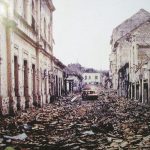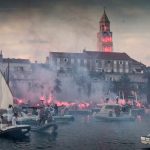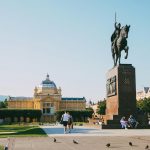ZAGREB, November 18, 2018 – Commemorative events marking Vukovar 1991 Remembrance Day and the 27th anniversary of the destruction of that eastern Croatian city in the country’s 1991-95 war of independence started with a commemoration outside the town hospital where 3,500 wounded people had been treated during the siege by the JNA and Serb paramilitary troops in 1991.
Attending the commemoration were numerous people who arrived from all over Croatia and abroad, top state officials, including President Kolinda Grabar-Kitarović, Parliament Speaker Gordan Jandroković, Prime Minister Andrej Plenković and other government officials, members of Parliament, and representatives of the diplomatic corps, the Catholic Church and other religious communities, numerous war veterans’ and victims’ associations and political parties.
After the commemoration outside the city hospital, the participants embarked on a 5.5 km walk to the Homeland War Memorial Cemetery where state and other delegations laid wreaths and light candles and a religious service was held.
Vukovar Remembrance Day is observed in memory of 18 November 1991 when the town’s defence lines were broken after a three-month siege by the Yugoslav People’s Army (JNA) and Serb paramilitaries. The besieged town was defended by around 1,800 members of the National Guard Corps, police and volunteers of the self-organised Croatian Defence Force (HOS), organised into the 204th Croatian Army Brigade.
Parliament Speaker Gordan Jandroković said on Sunday that message from Vukovar to Croatia and the world is that war is the worst solution to conflicts and that regardless of all the tragedy, in the end this was a great victory.
“We came here today primarily to pay our respects to Vukovar, its residents and express our gratitude for everything they have done for Croatia. We are remembering victims, those defenders and civilians who died, were killed or went missing. This was a great tragedy,” Jandroković said.
He also said that the message from Vukovar to the Croatian people and the whole world is that the war is the worst way to resolve conflicts and that solution must be sought in a peaceful fashion, through negotiations, taking into account the dignity of every people.
“The Croatian people in Vukovar showed heroism, readiness to make sacrifices, bravery, readiness to fight for their freedom and the Homeland and regardless of all the tragedy, in the end this was one great victory. This was the deciding battle which lead to Croatia’s final victory in the Homeland War,” Jandroković said.
Veterans’ Affairs Minister Minister Tomo Medved said that all feelings today were going out to the victims and heroes, those who were taken from the hospital to the Ovčara farm. We are still intensively searching for the missing, and we will continue to search for them, our efforts are aimed at finding every missing person, Medved told the press when asked about the fate of more than 300 missing persons.
Asked about communication with Serbia regarding that issue, Medved said Croatia was doing everything to be a responsible partner. We are doing this by insisting on a professional and responsible cooperation and this is what we will continue to do, Medved said. He said his ministry has finished a draft bill on Vukovar as a place of special reverence and that it was now fine-tuning it in cooperation with other ministries.
Interior Minister Davor Božinović said that a task force entrusted with investigating war crimes had raised the number of criminal charges by 35% compared to last year, of which three cases refer to the Ovčara war crimes, adding that this was how the task force would continue to work.
“I want to express my deep respect to all defenders and civilians whose sacrifice and exceptional bravery we remember today,” Božinović said. He added that the Interior Ministry was working intensively on resolving war crimes.
The president of the Social Democratic Party (SDP), Davor Bernardić, said on Sunday that today the country was remembering all victims who gave their lives for Croatia, in Vukovar, Škabrinja and the entire Homeland War.
“Vukovar had suffered mass destruction and we can only say – may this never happen again,” Bernardić said. “I want all people in Vukovar to live a dignified life, to have dignified salaries, without gaps and exceptions and that finally, after 27 years, we end the search for the missing so their families can finally find peace,” the SDP chief said. “This is the least that the country can do for them,” Bernardić stressed.
Prime Minister Andrej Plenkovič said that that the eastern Croatian town enjoyed the strong support of all state institutions, notably the government, and that a special system of benefits was being negotiated with the European Commission.
“We are here for the 20th remembrance procession since the completion of the peaceful reintegration of the Croatian Danube region, to express our respect for the sacrifice of Croatian defenders and all who gave their lives for a free and democratic Croatia, for the sacrifice of Vukovar, the symbol of the Homeland War and for all those who gave what they had for Croatia’s future and us who live in it today,” Plenković said in Vukovar.
Plenković recalled that a number of local projects had been launched after a government session in the town two years ago, adding that more than 490 families had been provided with accommodation, new buildings had been built or existing ones had been renovated, and that funding for Vukovar had increased by 50%.
“We now have to create and consolidate conditions for private businesses to start operating in Vukovar, for job creation, and for demographic revival,” the prime minister said.
Plenković believes that a special system of financial relief should be established for Vukovar, different from those applied in other parts of the country or the EU, which, he said, had to be agreed with the EC. “Talks are under way, and our position in that regard is firm because we believe that local circumstances are such that we should and can ask for such relief at EU level,” he said.
Asked what had changed since the October 13 protest held in Vukovar against the inefficiency of state institutions in prosecuting war crimes, Plenković said that the current government had made significant progress in that regard, greater than any other previous government, and that work on war crimes prosecution was now much more systematic. The Office of the Chief State Prosecutor has sufficient funding for its functioning, he said, adding that there were no problems regarding the government’s focus on war crimes prosecution.
Commenting on Independent Democratic Serb Party (SDSS) leader and MP Milorad Pupovac’s visit to Vukovar on Saturday, Plenković said that Pupovac had decided to visit yesterday and that by visiting the town he had sent a message of respect and paid tribute to the victims of Vukovar. “Any commemoration should primarily be about remembering the truth, and about respect for the victims, but it should also help turn to the future, reconciliation and coexistence,” he said.
“One of the key parts of first Croatian President Franjo Tuđman’s legacy was peaceful reintegration and in line with his policy of understanding, we should work to lessen any possibility for new victims, his policy of ensuring peaceful reintegration with the help of the international community was brilliant,” said Plenković.
The process of reconciliation is a difficult one, as evidenced by speeches by world leaders at the commemoration of the 100th anniversary of the end of World War I. “We live on a continent where reconciliation requires a lot of investment, knowledge of history, good will and cooperation for the future,” he stressed.
Asked if Tuđman’s decision on amnesty had been a good one, Plenković said that it was necessary to make a clear distinction between the Amnesty Act and war crimes. “War crimes are crimes against the sick, against civilians, the wounded and prisoners of war, there is no amnesty for that and that should be fully investigated and prosecuted. There is no statute of limitations on war crimes either under our law or under international conventions,” he said.
Asked who was to blame why a project for an intercultural school in Vukovar had not come to life, Plenković said that that was one of the examples that showed how demanding the process of reconciliation was. “A certain amount of time has to pass, trust must be built through the process of coexistence, and building trust starts with small steps towards creating a general climate. It is up to the state to create the general climate and in real life, those processes are time-consuming. There are too many scars here for that to happen overnight,” Plenković said.
Vukovar Mayor Ivan Penava said that the protest rally, held in that town in October due to discontent with the work of state institutions in prosecuting war crimes, had awakened state institutions, adding that we welcomed and appreciated that Independent Democratic Serb Party (SDSS) leader Milorad Pupovac visited Vukovar on Saturday.
“The protest is now behind us…to especially, our heroes, those living and those who are no longer with us are in our thoughts. Those who are responsible for the prosecution of war crimes should have them in their thoughts every day of the year,” Penava said. “That is all I can say. This is simply thinking of 1991, of the heroes of Vukovar, Croatian defenders, civilian casualties and all the innocent victims who were treated brutally by the Great Serbia aggressor after the town fell, because of the huge losses they had during the battle of Vukovar,” Penava said.
Asked whether he was satisfied with the results of the protest rally, he said that it was necessary to leave it to time to show, but that believed that something had started to happen. “Let’s have patience, we woke up state institutions and I think that they don’t have a lot of time, however, they need to be given some time to do what they should have done until now,” he added.
Penava also commented on SDSS MP Milorad Pupovac’s visit to Vukovar on Saturday, when he lowered into the waters of the Danube a wreath and lit a candle at the Homeland War Memorial Cemetery, noting on that occasion that all victims were important. “I don’t want to name any names and don’t want to speak about any victims except those of 1991. It is the wrong time and place to speak about other victims,” Penava said.
“I appreciate and welcome the fact that he came to pay tribute to the victims of the Great Serbia aggression, because they are the only ones we can speak about in Vukovar,” he concluded.
For more on Vukovar, click here.








